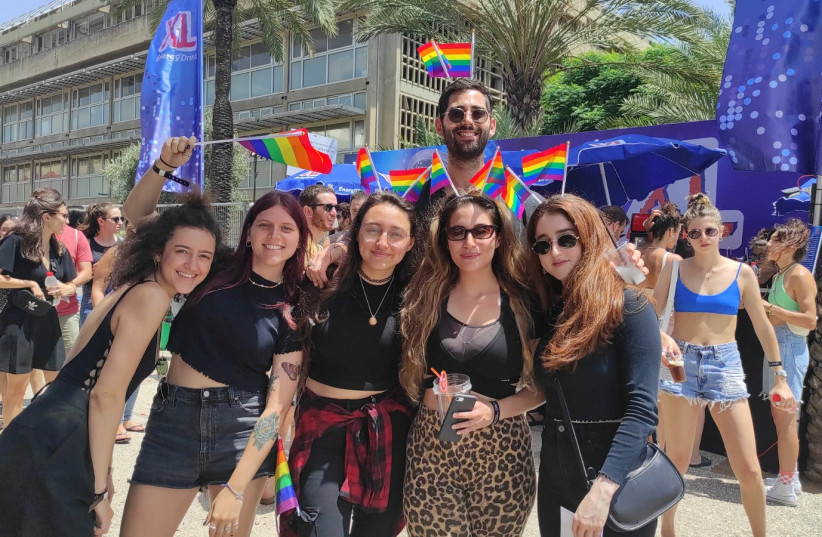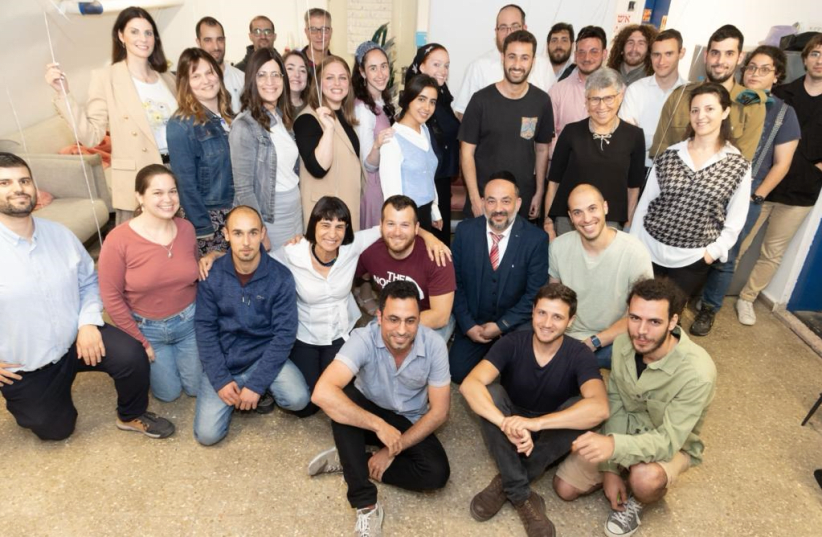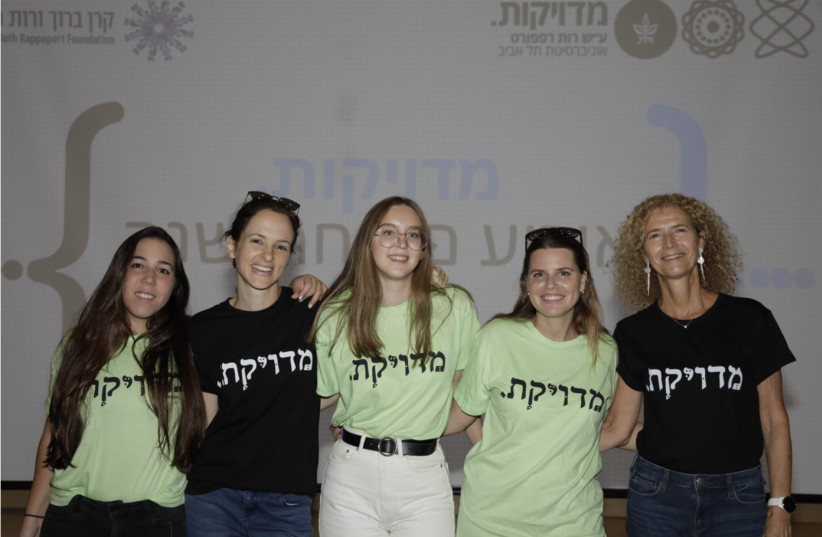“In Israel, there are very few opportunities to meet and have significant encounters with different groups – Jews and Arabs, ultra-Orthodox and secular, people living in Israel’s periphery and those from Israel’s center,” says Prof. Neta Ziv, vice president of the Equity, Diversity and Community Commission at Tel Aviv University.
“For many,” she continues, “academic life is the first opportunity to meet people that don’t look like them and talk like them and spend significant time together.”
With more than 30,000 students, TAU is the largest university in Israel. The desire to create a more inclusive campus was the driving force behind the establishment of TAU’s Equity and Diversity Commission in 2021. The commission deals with all aspects of equity and diversity on the TAU campus, including gender, Arabs, first-generation university students, people with disabilities, the LGBT community, members of the Ethiopian community, and the ultra-Orthodox. Since its inception, the commission has actively promoted equity and diversity among faculty, administration and the student body. While the initial title of the commission included “diversity” and “equity,” the word “community” was recently added, reflecting the school’s outreach efforts to the community at large.
“Advancing diversity and equity is one of our top priorities,” says TAU President Professor Ariel Porat, who explains that promoting diversity at the university benefits the country and the institution.
“There are several goals that are achieved through this initiative,” he says. “As a public university in the State of Israel, we have a responsibility to the country, which we fulfill through research, teaching and instruction, but also by encouraging the admission of minority groups into the university and providing them with opportunities to excel in their studies.”
“As a public university in the State of Israel, we have a responsibility to the country, which we fulfill through research, teaching and instruction, but also by encouraging the admission of minority groups into the university and providing them with opportunities to excel in their studies.”
Ariel Porat

Porat says that diversity ultimately improves the university. He points out that a diverse student body is beneficial for all of the students – not only for the minority groups. “Most of us in the university, for example,” says Porat, “have had little, if any, interaction with members of the Haredi community until they came to the university. Meeting with and learning about groups that one did not know before does more than help the community – it enriches the entire university.”
Porat notes that the school’s diversity policies do not conflict with the university’s academic standards. “We try to help students increase their chances of success with mentorship programs for students from the periphery and other groups, but we don’t compromise on an academic level.”
Porat traces his interest in achieving diversity from his early days as a lecturer in the university’s law school. “I was placed on the university social involvement committee,” he recalls. “Some committee members brought up the fact that Ethiopians were not being accepted into the more competitive schools at the university. We didn’t have a single Ethiopian student in the law school. I said, ‘That’s impossible. Let’s find students, and I will do what I can to get them accepted, even if they don’t meet the standards for the psychometric exam. The Dean of Students Office recommended a student whose grade was about one hundred points less than what was required for the psychometric score. However, she was the top student in her community. I said, ‘It’s impossible that the top student among 5,000 students in her community cannot be accepted. If that is the case, the problem is with the exam, not with her.’”
Porat says that the student was accepted and excelled in her studies.
The university has adopted this philosophy, and students from the periphery and other underrepresented groups have benefited from this adjustment to the school’s admission policies. TAU is currently examining its admittance procedures in an attempt to increase the number of minorities and other underrepresented populations. This includes students from the periphery, students who are the first generation of their family attending university, students of Ethiopian descent and Haredi students.
Prof. Ziv, who has had decades of experience examining social injustice, lists some of the major initiatives in diversity and equity that the university has developed. First, she points out that the goal in diversifying the student body is not simply to ensure that students from different backgrounds are accepted but that they succeed and excel in their studies.
Helping Israeli Arab students
For example, many Arab students entering TAU are not fluent in English and Hebrew. The university has instituted special language programs for Arab students focused on improving their language skills.
Ziv adds that while the percentage of Arab students among the Tel Aviv University student body – 16% – is comparable to the rate of Arabs in Israel’s population, the Arab student body is not evenly represented in the schools on campus. While Arab students constitute 30% of the students in the School of Management and the School of Architecture, there are far fewer Arab students in engineering and medicine. In addition, the number of Arab faculty members is also relatively low, and the university has begun implementing specific programs to support doctoral programs for Arabs, which would broaden the pipeline for more significant numbers of Arab faculty in the next generation.
Pointing out how diversity can enrich learning, she notes that Tel Aviv University recently hired its first Arab faculty member in the School of Architecture. “She brings in a research agenda that looks at architecture and planning in a way that is different than someone who didn’t grow up like she grew up in Israel,” says Ziv.
Increasing the number of haredi students
Tel Aviv University would also like to increase the number of Haredi students at the university from its current number, which is 160, says Ziv. The school recently opened a club for Haredi students and has a special support program for them as well.
Shmuel Drilman, a Haredi student studying for a master’s degree in sociology at TAU, says, “The Trailblazers (Movilim) program for the integration of students who have graduated from Haredi educational institutions helped me significantly, from registering with essential information and guidance, to mentors and providing help and solutions to different challenges that arise every day. I highly recommend to any Haredi student who aims high and strives for the best, not to be afraid – to come to Tel Aviv University and be assisted by the skilled professional staff and receive the world’s leading academic tools.”
Noa Batut, a first-year mechanical engineering student who participates in the first-generation higher education program, says, “As part of the program, we receive a package of assistance, beginning with an academic mentor who helps us with courses we find difficult. We have personal meetings with the program counselor who accompanies us closely, and every month we participate in group workshops that help us with learning, organizing and managing time, personal development and more. There is no doubt that the guidance and support of the program help us greatly in dealing with the various challenges of academia. The feeling is that the university cares about me and that my success is important to the university.”
Currently, students from the periphery make up between 13% and 14% of the student population, a number that the school would like to increase. To that end, as part of its community initiative, TAU will be going outside the university next year, says Prof. Ziv, and will connect to programs that have already identified excellent students from Israel’s periphery to bring them to the university.
Expanding to Israel's periphery, improving accessibility
In another manifestation of its community initiative, TAU has extended itself to the periphery through its Academic City program, whereby the university offers high-level courses to high school students in schools in Israel’s social and geographic periphery, in towns such as Dimona and Bat Yam.
Other community initiatives will share knowledge from TAU with members of the community. For example, the school of speech therapy is working with disadvantaged communities to help mothers communicate with their children from infancy..
Another soon-to-be-implemented plan that will make the university grounds more accessible is a plan, developed in conjunction with the Tel Aviv Municipality, to build a playground for neighborhood children with disabilities.
Porat is proud that the number of women in leadership positions has increased, noting that two of the university’s vice presidents are women, and the deans of three of the largest faculties at TAU – Exact Sciences, Humanities, and Medicine – are women.
In addition to the school’s increasing number of women leaders, TAU is striving to increase the number of women who reach advanced positions in the exact sciences. Porat points out that while about 40% of the undergraduate students in computer science are women, the number of women in advanced degree programs in the sciences has not kept pace.
To resolve this issue, TAU’s Dean of Exact Sciences, Prof. Tova Milo, has initiated its Meduyakot program, which aims to increase the number of women in master’s and doctoral programs in the exact sciences through a special mentoring program. The school is also making a concerted effort to help students with varying levels of disabilities by improving physical access to buildings and assisting students on the autistic spectrum. Roee, a graduate student on the autistic spectrum, says, “In recent years, I have made significant progress in both the social and academic aspects. The Diamond [Yahalom] program for students on the autistic spectrum made me feel like I was equal to all the other students on campus, and the sky was the limit for me.”
Making a shared space on campus
Tel Aviv University’s programs for diversity and equity extend beyond admissions and grades to helping the students feel at home at the university. “Part of the reasons that some students fail or do not reach their potential is feelings of alienation and not belonging to the university,” says Ziv. Each school is staffed with diversity officers who help students if they have issues or difficulties.
She adds, “Students come with expectations and requests. We work closely with the student body. There are challenges these days, especially with issues of free speech on campus, which is another issue under the commission’s mandate. Many students are starting to feel that Tel Aviv University is a home; and if it is not, they can talk about it and spell out their expectations.”
The university has attempted to make the campus what she terms “a shared space.” The commission supports a variety of projects that bring together students from different groups in academic and extracurricular settings, such as a course for Jewish and Arab students on Israel’s Declaration of Independence, co-taught by a Jewish and an Arab teacher; two joint theater groups (Arab/Jewish; with/without disabilities) that work on a theatrical production; and a geography project where 30 students from diverse backgrounds created a podcast about their move from home to TAU, sharing their identity and background.
While the university tolerates discussion, disagreement and spirited arguments, “the school will not tolerate racist and hateful comments about different groups,” says Porat. He cites an incident several years ago when an adjunct lecturer in sciences made highly derogatory remarks in class about Haredim in Israeli society. The teacher was removed. While not all cases cross the line of impropriety, Porat says that “If a student makes offensive remarks relating to someone’s ethnicity, faith or origins, we are looking for ways to deal with it.”
Summing up the goals of the Equity, Diversity and Community Commission, Prof. Ziv says, “Diversity leads to excellence in research and teaching. It is not something we do as a trade-off for our other missions. I teach in a class with Haredim and Arabs and transgender students. When I talk about culture and regulation and legislation, the discussion is much richer than it would have been otherwise. Diversity enriches our research and our teaching.”
Increasing the number of students from minority groups at TAU and assisting them in their integration; enlarging the number of Arab faculty members; and expanding the number of women in the exact sciences will make the university more representative of the colorful mosaic that makes up Israeli society. Ultimately, say President Porat and Professor Ziv, the school, the students, and the country will be better for it. ■

